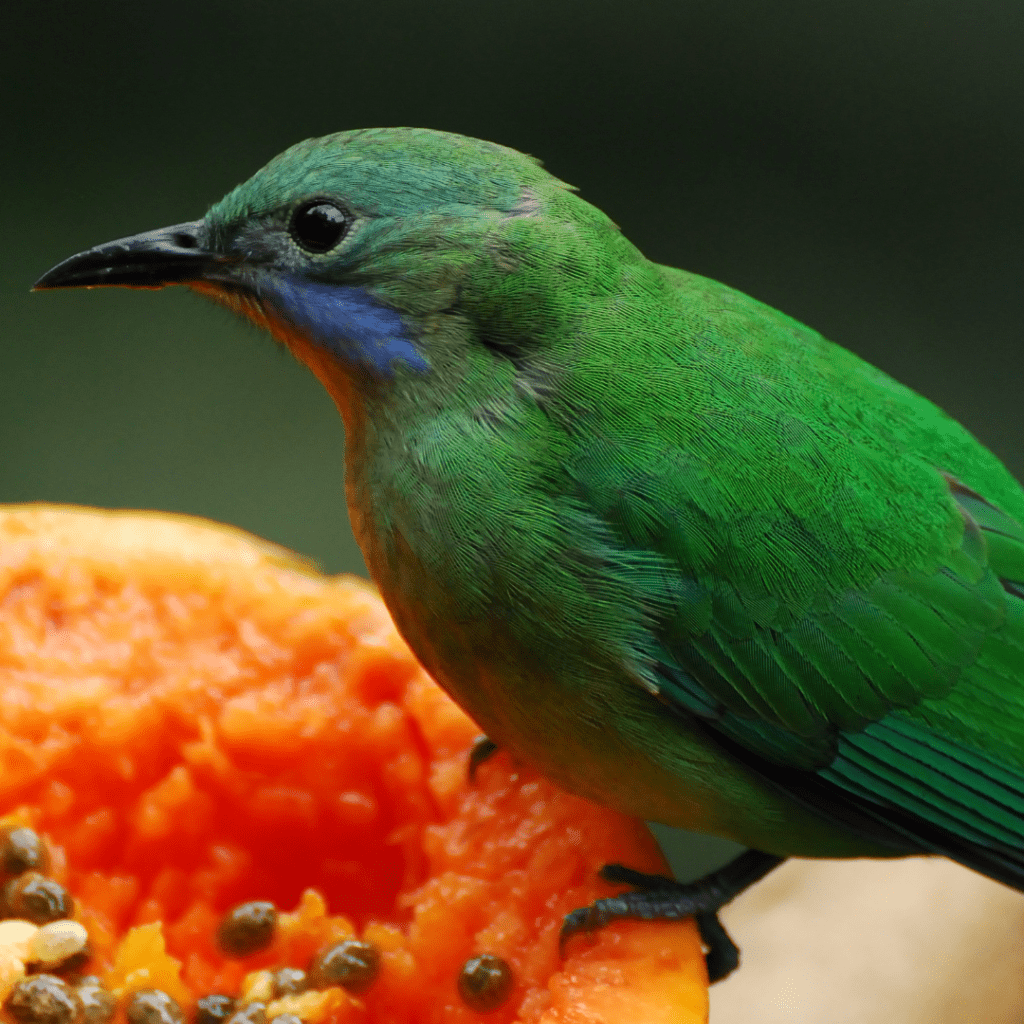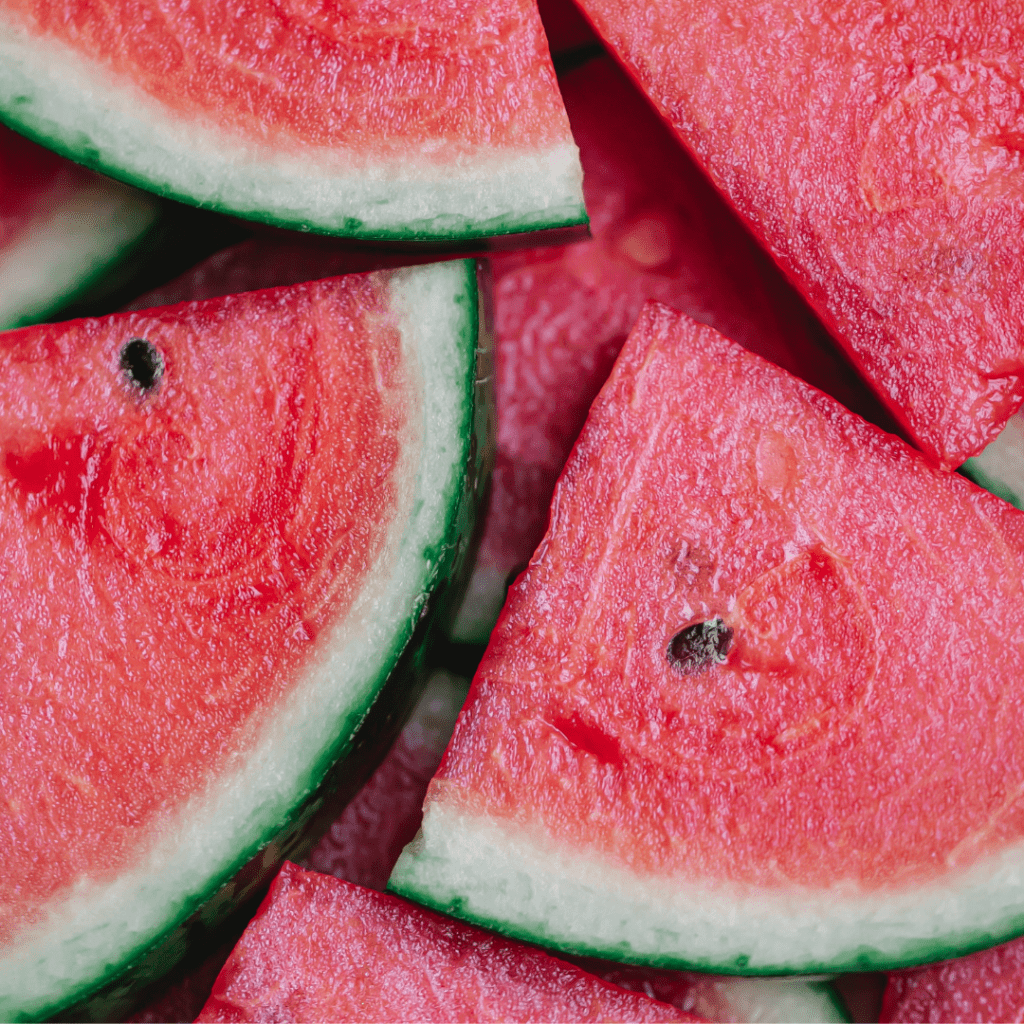
For pet bird owners as well as backyard birders, providing a healthy and enticing food variety is a top priority.
You can buy an entirely separate bunch of foods for the birds you feed. However, it’s efficient and fun to share your own foods when you have items on hand that are safe for birds.
One summertime favorite that many birders wonder about is watermelon.
Long story short: watermelon is safe for birds, and it’s a healthy treat that they love to snack on.
Watermelon is one of the world’s most widespread and popular fruits. Over 100 million tons of watermelon are produced each year. Only tomatoes and bananas are harvested in larger quantities.
Neighborhood birds don’t like missing out on a refreshing summer snack—they love watermelon too. Let’s review the safety, nutrition, and practicality of adding this favorite fruit to your backyard feeding supply.
Can Birds Eat Watermelon? Is Watermelon Good for Birds?
Compared to most sweet treats, watermelon is a healthy snack for humans and birds alike. It’s a high-sugar food, but the natural sugars in fruits aren’t considered problematic as part of a balanced avian diet.
All parts of watermelon are edible. That includes the seeds and even the rind.
Watermelon has a water content of around 92%. The remaining fruit-flesh material consists mostly of carbs and sugar, along with a bit of fiber and protein. Watermelon is rich in nutrients and antioxidants, including vitamins A, B6, and C.
While the fruit portion of a watermelon plant is mostly water, nutrients are more densely-packed in watermelon’s seeds.
A cup of watermelon seeds contains 31 g of protein, along with fair amounts of calcium (4% daily value), iron (44% daily value), and potassium (15% daily value).
Aside from the seeds, watermelon is lacking in protein and fats, which birds need. So, this tasty fruit wouldn’t make a perfect staple food—but it’s a nutritious and colorful snack option that birds love.
Do Birds Like to Eat Watermelon?
Birds tend to enjoy most fruits, and that includes watermelon.
Species like parrots that naturally eat fruit-heavy diets are attracted to the sweet flavors in fruit flesh. Meanwhile, backyard birds simply tend to be opportunistic feeders that are open to a variety of food types.
If you have an established feeding area for the birds that frequent your property, you should have no trouble convincing them to sample some watermelon slices.
Just be sure to cut off the rinds before serving watermelon. Rinds are edible. Unfortunately, they may carry harmful chemicals such as pesticides. If you do choose to leave the rinds on, you can reduce the chemical load by buying an organic variety and washing the watermelon before slicing it.
Do Birds Like Watermelon Seeds?
Omnivore birds are used to picking seeds out of plants or the ground.
Seeds are an ideal calorie source for most backyard birds. Blue jays, cardinals, chickadees, and most of their pals are all seed-lovers.
If you supply watermelon in your feeding area, it might be the seeds that catch the birds’ attention. As they peck around for tasty seeds, they’ll notice that the bright red flesh isn’t too bad, either.
Of course, if you haven’t bought a watermelon in a few years you might notice a major change in the fruit’s construction.
Remember watermelon seeds? They aren’t what they used to be.
Spitting out the seeds was once an integral part of the melon-eating experience. However, once seedless varieties were developed, those big black seeds started to disappear.
No-seed watermelons are made from parent plants with a sterile gene. It’s old-fashioned cross-breeding, not a case of GMO engineering.
Seedless varieties aren’t entirely seedless, but they contain a fewer amount of smaller, softer, lighter seeds (which are really just hollow seed coats) that are easier to eat.

More and more watermelons sold in the US are seedless. Currently, around 8% of retail watermelons are seeded, down from 10% in 2011 and 37% in 2003.
If you can find an old-school seeded watermelon, that’s a great choice for birds. The seeds will both draw them in and provide a nutritious snack.
However, when only seedless varieties are available, that’s okay too—especially if you already have a well-visited feeding area. If your backyard birds are already used to finding a variety of tasty snacks in your yard, they’re more likely to stop by to try something new.
Best Foods for Wild Birds
Watermelon is one of many fruits that make nice treats for pet birds as well as backyard birds. Other popular fruits for birds include:
- Blueberries
- Raspberries
- Grapes and raisins
- Sliced apples
- Sliced oranges
Besides fruit, here are some of the very best foods you can provide for birds:
- Sunflower seeds
- Millet
- Unsalted peanuts
If you want to share more of your people food with your bird buds, snacks like popcorn are okay for some birds as occasional treats. Just be sure to do your homework on individual foods before adding them to your feeding mix.
Finally, don’t forget about water! Many birders like to provide food, but fewer think to offer a clean water supply. Adding a birdbath or other water source to your property is a great way to support birds. Water is critical as a source for both drinking and bathing.
For more insights on feeding, understanding, and appreciating your local birds, visit the Happy Birding blog.

James has always been an avid outdoorsman. Since a kid, he kept a journal of all the different birds and species he saw. Now he wants to share his passion with other birders with Happy Birding!
